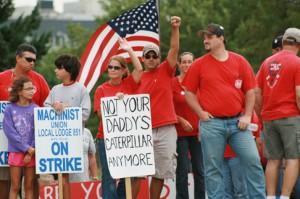Without Caterpillar Corporation, I probably wouldn’t exist.
Once upon a time, a Kansas farm boy (my grandfather) moved to central Illinois with some of his brothers to find work. He eventually caught on at Caterpillar in Peoria, where he became a union machinist — what he always called a “tool and die man.” He worked hard, got married, and started a family. Then around 1951, he was transferred to the brand-new Joliet hydraulics plant and moved here with his wife and two kids.
One of those children was my mother, then nine years old, who years later met and married my father — and just a few years afterward, I arrived on the scene. Hence my very existence depended upon, among others things, Grandpa getting that job at Cat.
I relate this family anecdote because when it comes to grappling with the meaning and significance of the current union strike at the Caterpillar plant in Joliet, now well into its fourth excruciating month, history matters. Personal connections matter.

In a working class town like this, where people from all walks of life have deep and sometimes tangled histories with the Joliet’s industrial past, labor disputes resonate. They’re not just abstract stories in the news about someone else somewhere else. They’re about us: our aspirations, our values, our prejudices, our sense of community.
As an Illinois citizen, I have a vested interest in Caterpillar remaining strong and vibrant. Its very identity is built from equal parts technological innovation, engineering expertise, and good old-fashioned hard work. Cat’s products and the myriad of jobs the company provides are important to Illinois’ economic vitality.
But as the grandson of a tool and die man, I also feel solidarity with the hundreds of striking machinists out on Route 6. In their rejection of Cat management’s offers of a new long-term work contract, Local 851 union members hardly are asking for the moon. What they’re putting themselves on the line for, rather, is the preservation of good blue-collar jobs within America’s embattled middle class.
Caterpillar management’s latest offer to the workers (up for a vote today) would freeze wages, double health care expenses, and cut into pension benefits. One shouldn’t forget that Cat has had a longstanding multi-tier pay schedule in place for union machinists, with those hired after May 2nd, 2005, getting significantly lower wages than older “Tier 1” workers. So-called “supplemental” machinists get paid even less than the Tier 2 folks. See a pattern?
Meanwhile, Caterpillar achieved record sales, revenues, and profits in 2011 — and its second quarter profits in 2012 are the highest in company history. Yet with labor contract talks at fits and starts, Cat is playing hardball by advertising for and hiring replacement workers, thereby taking advantage of high local unemployment conditions in which any job seems like a good job.
The Caterpillar labor dispute is thus a microcosm of the growing cultural conflict between the exaltation of corporate greed and self-interest (the market rules best) and the long-term viability of America’s working class (the people matter most).
Most folks agree that our country needs good manufacturing jobs with decent wages and benefits, that companies should play fair, and that employees should work hard. But how do we put those common values into practice? We’ll soon find out here in Joliet.*
* On Friday, just a few hours after this article appeared in the 17 August 2012 edition of the Joliet Herald-News, the striking machinists’ union voted to approve Caterpillar’s most recent contract offer, as reported here in the Chicago Tribune and other sources. Details about the vote totals were not released, but apparently it was close. Early analysis indicates that the union conceded on several key issues, including the doubling of health care premiums, the elimination of pensions, and a reduction in seniority rights.